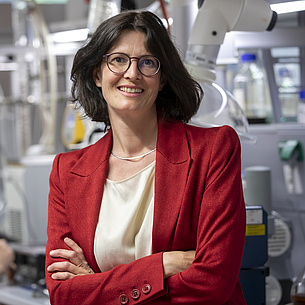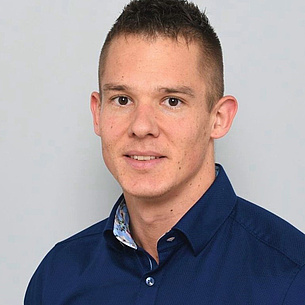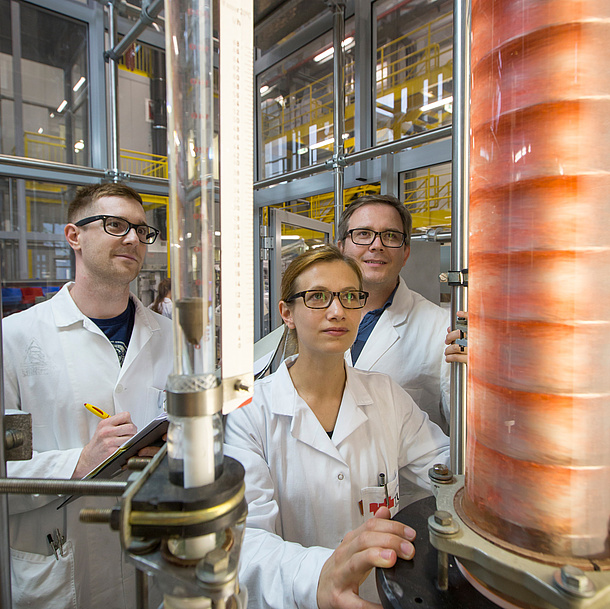Quick Facts
- Duration of study: 4 semesters
- ECTS credit points: 120
- Academic degree:
Diplom-Ingenieurin
orDiplom-Ingenieur
(Dipl.Ing. or DI), equivalent to the Master of Science (MSc) - Language of instruction: English
The Master's Programme
The master’s degree programme Biorefinery Engineering
places a focus on the material and energetic utilisation of bio-based raw materials. In addition, you become familiar with different technical fields of knowledge regarding the conversion of biogenic raw materials into materials and energy, such as process engineering, chemistry, and biotechnology. In addition, you will acquire expertise in energy technology, environmental technology, and logistics.
For example, you will perform the following tasks:
- Extraction of organic acids from the by-products of the pulp industry
- Isolation of different valuable substances, e.g. such as separating lignin or lactic acid from aqueous process streams
- Thermal conversion of biomass into heat, electricity, and fuel
- Cascading use of raw materials
- Use of biogenic raw materials as electrolytes in battery technology
Research-guided teaching is an essential part of the degree programme. By taking part in various practical laboratory courses and laboratory projects, students deepen the knowledge they have acquired and have access to central labs at TU Graz (e.g. electron microscopy).
In this practical degree programme, you learn to scale-up laboratory results to the industrial scale. Two aspects that play important roles are the high-quality supervision provided for students in small groups and the excellent exchange enabled between students and teachers.

The close link with practice and the orientation towards innovation of this degree programme enables students to carry out high-quality, structured research work and to develop innovative systems with a scientific basis to convert biogenic resources into energy and high-quality products economically and with great ecological responsibility as part of a modern bioeconomy.
Focus Areas
You will acquire basic knowledge in the following compulsory modules:
Engineering Basics: You become familiar with the main theorems of thermodynamics and learn to analyse thermodynamic processes and apply this knowledge in process simulation.
Mass and Heat Transfer: You deepen your knowledge in areas of characterisation and analysis of material flows.
Chemical and Analytical Aspects of Biorefineries: You learn how to analyse and produce new bio-based materials using chemical and physical processes.
Biorefinery Economic, Ecological and Social Aspects: For example, you learn how to perform a life cycle assessment and analyses of economic and ecological value chains.
Bioresources: You learn how to recognise potential hurdles as well as identify possibilities and biorefinery perspectives.
Biorefinery Technologies: You will learn mechanical and thermal separation processes that are used in the bio-based industry and familiarise yourself, for example, with pulp and paper production.
Biorefinery and Energy Systems: You learn more about thermochemical conversion processes and are able, for example, to understand how heat, electricity, and fuels are produced by performing thermochemical biomass conversion.
Biorefinery Project: You develop and present solutions when given a practical task set in an industrial and/or scientific environment.
In addition, you can choose individual focal points in the following elective modules:
- Energy Utilisation
- Material Utilisation and Recovery
Collaborations and Networks
As part of the master's degree programme Biorefinery Engineering
, international teaching staff (e.g. from Twente, Ljubljana, or Hamburg) as well as teaching staff from various companies that are active players in the field of biorefinery engineering. A close connection exists with industry on national and European levels, which becomes noticeable for the students in the form of cooperation projects (e.g. project work or master’s thesis work), excursions, and cooperation events. Practice-based work and applied research in cooperation with industry are prioritised. For example, students are also involved in current projects as student employees.
In so-called Student Camps, interdisciplinary teams of students work to address real issues in the bio-based industry with the support of experts from industry and science. The Student Camps are held both in Austria and abroad to promote international exchange.
Furthermore, students receive optimal preparation for a career in an international environment by taking advantage of numerous offers: international practical internships, the chance to participate in international winter and summer schools in Germany and abroad, or to spend a semester abroad.
Admission
The prerequisite for admission is a completed bachelor’s degree in a relevant subject (see curriculum).
Additionally, you need to provide evidence of competence in the English language.
1. Admission Procedure
Admission without admission procedure
The following categories of applicants are eligible for the master’s programme without an admissions procedure:
Graduates of the following bachelor’s programmes at TU Graz or the University of Graz:
Graduates of all other degree programmes offered at the TU Graz or, in the case of a NAWI Graz programme, the University of Graz can apply for admission at the Registrar's Office without an admission procedure.
Admission with admission procedure
Graduates of a previous study programme not mentioned above undergo an admission procedure.
Registration for the academic year 2026/27: 15 October to 15 December 2025
You can complete the admission procedure before the end of your bachelor’s studies.
Please do not send any documents by post!
2. Admission
- Admission and deadlines for international students
- Admission and deadlines for Austrian students who are registering to study at TU Graz for the first time
If you have already been admitted to a degree programme at TU Graz, or have studied at TU Graz before, please come to the Registrar's Office in person to complete your admission during the admission period.
Fragen zur Zulassung?
Contact study@tugraz.at
Career Prospects

The practice-based teaching content and international networking, e.g. Summer Schools or Student Camps, provide an optimal foundation for the later work in research and industry. The chance to conduct research on innovative processes and materials from renewable resources, as well as the varied career opportunities that arose as a result, made this degree programme especially interesting to me. After completing my master's degree, I decided to pursue a Doctoral Programme in Biorefinery Engineering at TU Graz to add to the knowledge I had gained.
Professional Fields
Biorefinery Engineers are key experts for the implementation of an innovative bio-economy and the circular economy
, both of which are high-ranking goals in European economic and research policy. They are in great demand in Europe, providing interdisciplinary support along the entire value chain in the bio-based industry.
Biorefinery Engineers
- support the transition to a sustainable energy and economic system.
- work together with experts from other disciplines who operate in the value chain for biogenic resources.
- develop, plan, and use innovative, technical products and processes for the economically and ecologically sustainable use of biogenic resources.
- design and operate process engineering plants for the production of bio-based materials.
- recognise trends in the bio-based industry and translate innovations into business models.
- develop innovative bio-economic systems using scientific methods.
- perform management tasks in an international and interdisciplinary environment.



